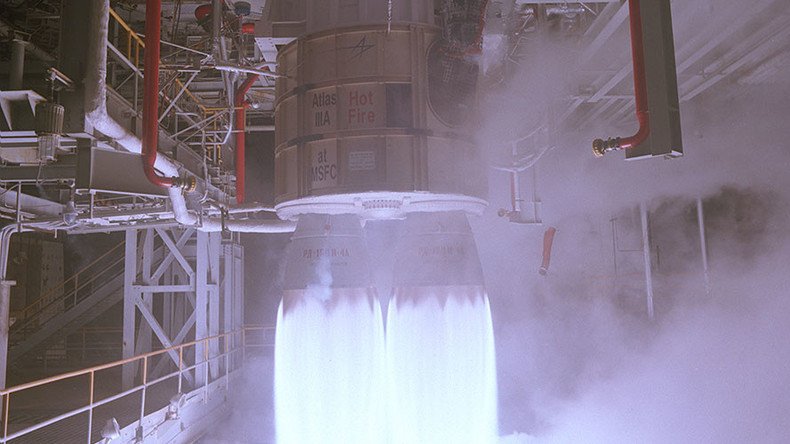McCain sees red as US gives green light for Russian RD-180 rocket engines order

The US has ordered 20 additional RD-180 rocket engines from Russia, days after US Congress lifted the ban on the use of Russian engines to get American ships into space. However, the move has been lambasted by some politicians in Washington.
United Launch Alliance announced that it placed an order for more RD-180 rockets to be used by Atlas V launch vehicle, on top of 29 engines that the company has ordered before US sanctions against Russia were introduced over Crimea last year.
Under last year’s National Defense Authorization Act of 2015, the Department of Defense is prohibited from signing new or modifying existing contracts for launches using engines designed or manufactured in Russia.
READ MORE: ‘Why fund Putin’s cronies?’ McCain slams fellow Republicans for lobbying Russian space engines
The move brought a fierce response from Senator John McCain, who accused Washington of double standards, saying, “This is the height of hypocrisy.”
“How can our government tell European countries and governments that they need to hold the line on maintaining sanctions on Russia, which is far harder for them to do, when we are gutting our own policy in this way?” McCain said on Wednesday, as cited by the Washington Post.
“How can we tell our French allies in particular they shouldn’t sell Vladimir Putin amphibious assault ships as we have [told them], and then turn around and try to buy rocket engines from Putin’s cronies?”
Xmas comes early for #VladimirPutin... "Lockheed-Boeing venture orders 20 more #Russian rocket engines" https://t.co/QrEU1KBMf3
— John McCain (@SenJohnMcCain) December 23, 2015The order placement to Russian company Energomash comes after Congress passed the fiscal 2016 budget, which includes a provision that allows the US to continue purchasing the Russian made engines.
“ULA has ordered additional Atlas engines to serve our existing and potential civil and commercial launch customers until a new American-made engine can be developed and certified,” the company said in a press release.
The new batch of engine deliveries would start once ULA received all of the previous order, according to ULA spokeswoman Jessica Rye who said that eight RD-180 engines were received by the company this year.
Op-ed | We Do Need Russian Rockets, for a While Longer https://t.co/MMAtGRETxwpic.twitter.com/Q8LmmAJYow
— SpaceNews (@SpaceNews_Inc) December 23, 2015To break the dependency on Russian engines, last year ULA has partnered up with Blue Origin to develop the BE-4 LOX/methane engine to replace the RD-180. Dynetics and Aerojet Rocketdyne have also offered their AR-1 hydrocarbon-fueled rocket engine as replacement for the Russian counterpart.
However, the US has realized they are unable to continue their space program without Russian assistance, according to Aleksandr Stadnik, Russia's trade representative to the US.
"[The US] must have understood that they needed this Russian equipment for development of rocket technology, otherwise they would have to limit themselves in a series of expensive projects. It is evident that this is the reason the supply of our engines was continued," Stadnik told RIA Novosti.
He said Moscow and Washington will also continue the contracts which Russian rocket maker Energia (NPO Energomash) signed in January worth $1 billion with the US Orbital Sciences Corporation for the delivery of sixty RD-181 engines, which is closely related to the RD-180.
US receives two RD-181 rocket engines under latest $1bn contract with Russia http://t.co/PE5zeuH3Ispic.twitter.com/IsXUrewbeo
— RT (@RT_com) August 5, 2015The RD-181 engine was developed specifically for the US Antares rockets; it allows more cargo to be brought up to the International Space Station. Energia has cooperated with the US since 1990, delivering RD-180 engines for Atlas rockets.
According to Orbital, Russian rocket engines offer “the best combination of schedule availability, technical performance and cost parameters as compared to other possible options.”
In April, the Department of Defense pleaded with Congress to allow Russian rocket engines to be used until 2022, in order to keep the country’s space program going.
General John Hyten, head of the US Air Force Space Command, said the Pentagon made an official request to change legislation adopted in December 2014, which would see Russian RD-180 rocket engines replaced by American versions from 2019.













